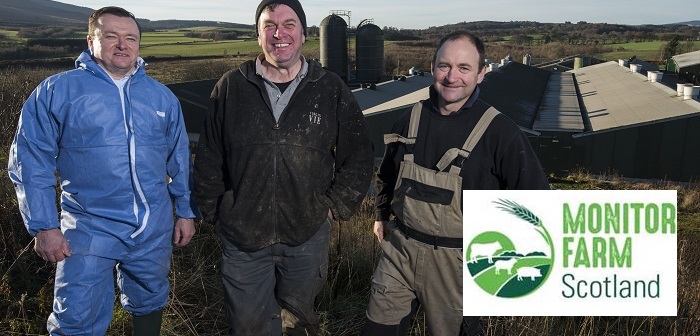Scotland’s new pig monitor farmer, Patrick Stephen, is confident that the future holds “many opportunities” for the sector, despite recognising the vagaries of the current pig market.
“Scotland has a lot going for it with regards pigs,” said Mr Stephen, whose farming business is based at Conglass near Inverurie. “We have a decent enough climate which allows us to grow plenty of grain for use as feed and now we have a pig processing facility close at hand.
“Farmers can have a tendency towards doom and gloom but pigs have been good for us and when prices are right they can make money quicker than any other enterprise.”
A director of Quality Pork Ltd. (QPL), which runs the new pig abattoir at Brechin, Mr Stephen is also chairman of Huntly-based pig supply co-operative Scottish Pig Producers (SPP).
“I have always been keen to play my part in the Scottish pig industry and that is one of the reasons I was happy to support the monitor farm initiative,” he said.
The aim is to run five meetings a year over the four-year life of the project. For biosecurity reasons, however, the meetings will be held off-farm with use made of videos to demonstrate on-farm practice to the group.
The project is jointly funded by Quality Meat Scotland (QMS) and Opportunity North East (ONE), a private sector economic development company that aims to broaden and strengthen the regional economy through sector initiatives in food, drink and agriculture; life sciences, oil and gas; and tourism. ONE is backed by an investment of £25 million over five years from the Wood Foundation.
Mr Stephen’s pig unit is based at Mill of Carden, Pitcaple, around four miles from Conglass and is run by unit manager Wayne Ducker and a staff of three. They look after 530 sows with all progeny finished on the site, with the exception of around 600 weaners which go out to straw yards on a “bed and breakfast” basis weighing around 40 kilograms.
Finished pigs, at between 110 and 115 kilograms liveweight, go through SPP to either QPL at Brechin or Woodhead Bros at Colne in Lancashire.
The enterprise was originally run as a multiplier unit producing high grade gilts, while in recent years it has been focussed on producing carcase pigs. The female line is JSR Genepacker 90 with JSR 900 or Danbred Duroc used as terminal sires using AI.
“I think we could get better at monitoring growth,” said Mr Stephen. “Apart from anything else we have two feed systems, ad-lib and restricted feeding, and I would like to know which performs best. It will also be interesting to find out whether daily growth rate is more important than feed conversion ratio.”
Headline image shows (l-r) Allan Ward, QMS Pig Specialist; Wayne Ducker and Patrick Stephen




